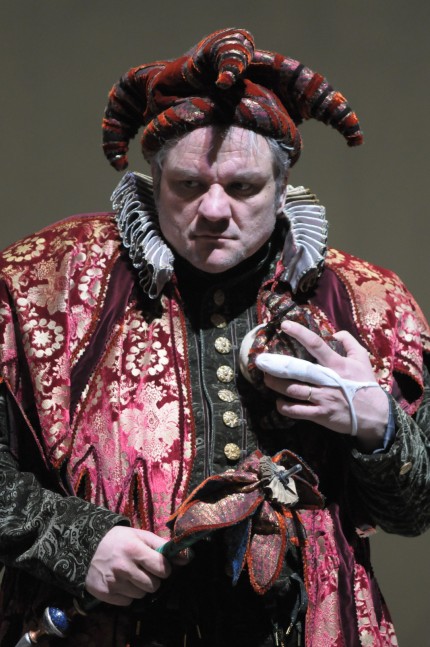With hunchback deux, Lyric Opera’s “Rigoletto” remains a superb show

Meet the new hunchback. Even better than the old hunchback.
For the second half of its run of Rigoletto, the Lyric Opera has a new court jester starring in Verdi’s dark tragedy.
Making his Chicago debut Thursday afternoon was Željko Lučić, who is singing the final five performances. The embittered Rigoletto is a signature role for the Serbian baritone, who comes direct from New York where he tackled the same assignment in the Met’s much-discussed “Rat Pack Rigoletto” set in Las Vegas.
Andrzej Dobber, who opened this production was by no means lacking as the jester whose only soft spot is for his innocent daughter Gilda. The Polish baritone brought a powerful Slavic voice, solid technique and commanding presence to the role.
While Lučić has a less ample sonority, his baritone offers plenty of muscle when needed in the big dramatic moments. Lučić’s instrument had greater tonal refinement as well as flexibility, and he phrased the more interior moments with the delicacy of a lieder singer. Perhaps most strikingly, where Dobber’s acting was generalized, Lučić is a more engaged and incisive dramatic presence, and overall brings a wider range of emotion and expression to the role.
The only problem is that the Lyric once again is being chintzy with second-cast rehearsal time, which was made painfully clear in Act 2 where Lučić and Albina Shagimuratova as Gilda were clearly and repeatedly not on the same page in their movements and blocking. A major opera company doesn’t pinch pennies on necessary rehearsal time even when just one new principal is added to a production.
Otherwise, the production is the same, largely successful show that opened a month ago. Shagimuratova remains a compelling and beautifully sung Gilda, the Russian soprano’s Caro nome even more radiant than on opening night.
Giuseppe Filianoti as the rakish Duke avoided the kind of crash and burn that happened opening night, largely because he avoided top notes almost entirely. That’s too bad because much of his singing was idiomatic, rich in tone with the requisite swagger. But a Duke of Mantua without a high C is a semi-Duke at best.
Evan Rogister’s fiery conducting remains a key element. Andrea Silvestrelli’s Sparafucile is darker and more menacing, which is all to the good.
In an unplanned moment at Thursday’s matinee, Silvestrelli as the assassin, was playing with his knife when he lost his grip and it flew off the set platform out of reach. Staying in character, the resourceful Italian bass held up a small knife from the table and considered it, but then ultimately dispatached Gilda with the Duke’s sword—a completely apt and symbolically rich bit of improvisation.
Rigoletto runs through March 30. lyricopera.org
Posted in Performances





Posted Mar 15, 2013 at 2:58 pm by Geri Yaccino
I have been thinking about yesterday’s performance and was pleased to see that you reviewed our new Rigoletto. I, too, enjoyed his rich voice, but from the moment he almost missed hopping on to the revolving set in the first act, I was worried about him. And I also was cringing for Filianoti, hoping for a better performance than opening night. I don’t think I have ever heard a duke avoid the requisite (all right, expected and anticipated) high notes and I worried about him, too. A shame that he had to sing after the lecture featured Pavarotti. The soprano was superb and deserved a better match.